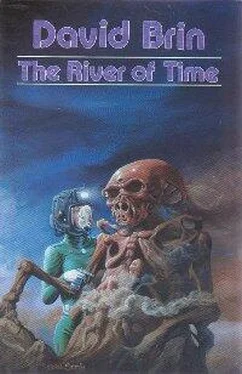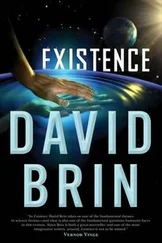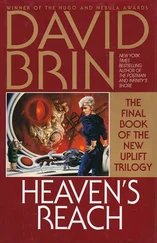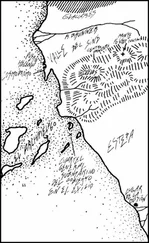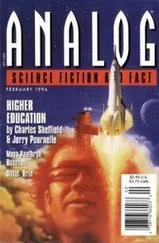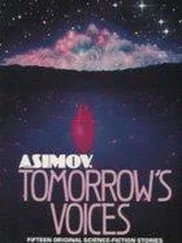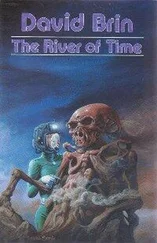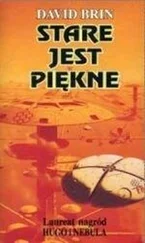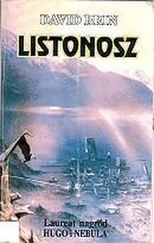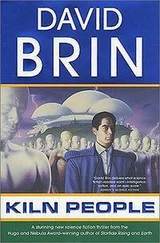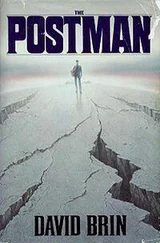David Brin - Lungfish
Здесь есть возможность читать онлайн «David Brin - Lungfish» весь текст электронной книги совершенно бесплатно (целиком полную версию без сокращений). В некоторых случаях можно слушать аудио, скачать через торрент в формате fb2 и присутствует краткое содержание. Год выпуска: 1986, ISBN: 1986, Издательство: Dark Harvest, Жанр: Фантастика и фэнтези, на английском языке. Описание произведения, (предисловие) а так же отзывы посетителей доступны на портале библиотеки ЛибКат.
- Название:Lungfish
- Автор:
- Издательство:Dark Harvest
- Жанр:
- Год:1986
- ISBN:0-913165-11-5
- Рейтинг книги:3 / 5. Голосов: 1
-
Избранное:Добавить в избранное
- Отзывы:
-
Ваша оценка:
- 60
- 1
- 2
- 3
- 4
- 5
Lungfish: краткое содержание, описание и аннотация
Предлагаем к чтению аннотацию, описание, краткое содержание или предисловие (зависит от того, что написал сам автор книги «Lungfish»). Если вы не нашли необходимую информацию о книге — напишите в комментариях, мы постараемся отыскать её.
Lungfish — читать онлайн бесплатно полную книгу (весь текст) целиком
Ниже представлен текст книги, разбитый по страницам. Система сохранения места последней прочитанной страницы, позволяет с удобством читать онлайн бесплатно книгу «Lungfish», без необходимости каждый раз заново искать на чём Вы остановились. Поставьте закладку, и сможете в любой момент перейти на страницу, на которой закончили чтение.
Интервал:
Закладка:
I wait here. Our rock’s slow rotation now has me looking out upon the sweep of dust clouds and the hot, bright stars that the humans quaintly call the Milky Way. Many of the stars are younger than I am .
I contemplate the universe as I await the proper time to make my move .
How long I have watched the galaxy turn! While my mind moved at the slowest of subjective rates, I could follow the spiral arms swirling visibly past this little solar system, twice bunching for a brief mega-year into sharp shock fronts where molecular clouds glowed, and massive stars ended their short lives in supernovae. The sense of movement, of rapid travel, was magnificent, though I was only being carried along by this system’s little sun .
At those times I could imagine that I was young again, an independent probe once more hurtling through strange starscapes toward the unknown .
Now, as my thoughts begin to move more quickly, the bright pinpoints have become a still backdrop again, as if hanging in expectancy of what is to happen here .
It is a strange, arrogant imagining—as if the Universe cares what happens in this tiny corner of it, or will notice who wins this little skirmish in a long, long war .
I am thinking fast, like my biological friend whose tiny ship floats only light-seconds away, just two or three tumbling rocks from this one. While I prepare a surprise for my erstwhile companions, I still spare a pocket of my mind to follow her progress… to appreciate the tiny spark of her youth .
She is transmitting her report back to Earth now. Soon, very soon, these planetoids will be aswarm with all the different varieties of humans—from true biologicals to cyborgs to pure machines .
This strange solution to the Maker Quandary—this turning of Makers into the probes themselves — will soon arrive here, a frothing mass of multiformed human beings .
And they will be wary. Thanks to her, they will sense a few edge-glimmers of the Truth .
Well, that is only fair .
12
The last samples had been loaded aboard the Hairy Thunderer . Each drone lay settled in its proper niche. The light and radar beacon on the planetoid pulsed brightly, so follow-up expeditions would waste no time making rendezvous with the find of the century.
“All packed up, Urs.” Gavin floated into the dimly lit control room. “Two months in orbit haven’t done the engines any harm. We can maneuver whenever you like.”
Gavin’s supple, plastiskin face was somber, his voice subdued. Ursula could tell that he had been doing a lot of thinking.
She touched his hand. “Thanks, Gavin. You know, I’ve noticed…”
Her partner’s eyes lifted and his gaze met hers.
“Noticed what, Urs?”
“Oh, nothing really.” She shook her head, deciding not to comment on the changes she saw… a new maturity, and a new sadness. “I just want you to know that I think you’ve done a wonderful job. I’m proud to have you as my partner.”
Gavin looked away momentarily. He shrugged. “We all do what we have to do…” he began.
Then he looked back at her. “Same here, Ursula. I feel the same way.” He turned and leapt for the hatch, leaving her alone again in the darkened control room.
Ursula surveyed scores of little displays, screens and readouts representing the half-sentient organs of the spaceship… its ganglia and nerve bundles and sensors, all converging to this room, to her.
“Astrogation program completed,” the semisent main computer announced. “Ship’s status triple checked and nominal. Ready to initiate first thrust maneuver and leave orbit.”
“Proceed with the maneuver,” she said.
The screen displays ran through a brief countdown, then there came a distant rumbling as the engines ignited. Soon a faint sensation of weight began to build, like the soft pull they had felt upon the ruined planetoid below.
The replication yards began to move beneath the Hairy Thunderer . Ursula watched the giant, twisted ruins fall away; the beacon they had left glimmered in the deathly stillness.
A small light pulsed to one side of the instrument board. Incoming Mail, she realized. She pressed the button and a message appeared on the screen.
It was a note from The Universe . The editors were enthusiastic over her article on interstellar probes. Small wonder, with the spreading notoriety over her discovery. They were predicting the article would be the best read piece in the entire solar system this year.
Ursula erased the message. Her expected satisfaction was absent. Only a hollow feeling lay in its place, like the empty shell of something that had molted and moved on.
What will people do with the knowledge? She wondered. Will we even be capable of imagining the correct course of action to take, let alone executing it properly?
In the article, she had laid out the story of the rock wall—carved in brave desperation by little biological creatures so very much like men. Many readers, probably, would sympathize with the alien colonists, slaughtered helplessly so many millions of years ago. And yet, without their destruction mankind would never have come about. For even if the colonists were environmentalists who cared for their adopted world, evolution on Earth would have been changed forever if the colony had succeeded. Certainly human beings would not have evolved.
Simple archaeological dating experiments had brought forth a chilling conclusion.
Apparently, the mother probe and her replicas died at almost precisely the same moment as the dinosaurs on Earth went extinct—when a huge piece of debris from the probe war struck the planet, wreaking havoc on the Earth’s biosphere.
All those magnificent creatures, killed as innocent bystanders in a battle between great machines… a war which incidentally gave Earth’s mammals their big chance.
The wall carvings filled her mind—their depictions of violence and mayhem on a stellar scale. Ursula dimmed the remaining lights in the control room and looked out on the starfield.
She found herself wondering how the war was going, out there.
We’re like ants, she thought, building our tiny castles under the tread of rampaging giants. And, like ants, we’ve spent our lives unaware of the battles going on overhead.
Depicted on the rock wall had been almost every type of interstellar probe imaginable… and some whose purposes Ursula might never fathom.
There were Berserkers , for instance—a variant thought of before in Twentieth Century science fiction. Thankfully, those wreckers of worlds were rare, according to the wall chart. And there were what appeared to be Policeman probes, as well, who hunted the berserkers down wherever they could be found.
The motivations behind the two types were opposite. And yet Ursula was capable of understanding both. After all, there had always been those humans who were destroyer types… and those who were rescuers.
Apparently both berserkers and police probes were already obsolete by the time the stone sketches had been hurriedly carved. Both types were relegated to the corners—as if they were creatures of an earlier, more uncomplicated day. And they were not the only ones. Probes Ursula had nicknamed Gobbler , Emissary , and Howdy also were depicted as simple, crude, archaic.
But there had been others.
One she had called Harm , seemed like a more sophisticated version of Berserker . It did not seek out life-bearing worlds in order to destroy them. Rather it spread innumerable copies of itself and looked for other types of probes to kill. Anything intelligent. Whenever it detected modulated radio waves, it would hunt down the source and destroy it.
Читать дальшеИнтервал:
Закладка:
Похожие книги на «Lungfish»
Представляем Вашему вниманию похожие книги на «Lungfish» списком для выбора. Мы отобрали схожую по названию и смыслу литературу в надежде предоставить читателям больше вариантов отыскать новые, интересные, ещё непрочитанные произведения.
Обсуждение, отзывы о книге «Lungfish» и просто собственные мнения читателей. Оставьте ваши комментарии, напишите, что Вы думаете о произведении, его смысле или главных героях. Укажите что конкретно понравилось, а что нет, и почему Вы так считаете.
